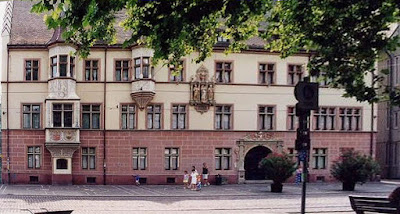and communism
ad nauseam. Here is the blog announced earlier, containing what I learned
on the bus ride to Zürich about socialism and communism.
Karl Marx did not invent socialism, a word that most Americans abhor. Socialist ideas were articulated much earlier by the 1848/49 revolutionaries, among others. Here is the translation of the decisive paragraph of an article published in
Der Festungs-Bote No 10. It was the last newspaper printed in besieged Fort Rastatt towards the end of the Baden Revolution, crushed by Prussian troops on July 18, 1849:
What is a social democracy, and what is its aim?
Democracy alone will give us neither jobs nor bread. It will not pay the interest on our debts. It will not liberate us from sorrows and sufferings, for when trying to bring the people to power, it consistently stumbles against the disproportion of property of possession. Socialism tries to solve this disproportion by creating equality ... According to the socialists, the distribution of goods shall depend on work. Thereby the best possible equality among people shall be achieved. Each hardworking, decent, industrious man shall have the opportunity to acquire sufficient property to assure him a reasonable enjoyment of life...
This is the gist of modern socialism, whereas Karl Marx, in his main work
Das Kapital instead tried to give a scientific basis to communism. While in socialism,
people should have the opportunity to acquire sufficient property to ensure a reasonable enjoyment of life, in communism, private property is limited to a few personal belongings.
 |
| Marx among his books (©Andreas Höfert) |
According to Marx's theory, man* is a working social being. A man should find his personal fulfillment in his work, but he becomes alienated because the product of his labor does not belong to him. So he regards work as a burden. Although man is the brother of his fellow men, he becomes estranged from them primarily because of his private property.
*
For political correctness, replace man with woman, he by she, himself by herself, etc.
In communism, private property does not exist, and all people are supposed to be equal. So man will eventually recognize himself as a human being. While in capitalism, a minority dominates a majority, in communism, a dictatorship of the proletariat will rule, a situation that Lenin called full democracy*. Communism will give peace, work, freedom, equality, and happiness to the world.
*In countries of the communist block after 1945, the term Volksdemokratie (people's democracy) was coined.
During the revolutionary uprisings in Europe in March 1848, Marx lived in Vienna as a correspondent for the Cologne-based radical newspaper
Rheinische Zeitung (Rhineland News). The working class residing in the suburbs of the Austrian capital was the driving force of the uprising, in contrast to the revolution led by the bourgeoisie in other German regions and cities. Marx, who with his sponsor Friedrich Engels had published the
Communist Manifesto in February 1848, was excited, imagining that the predicted proletarian revolution had come. However, it turned out that in Vienna, the national guard and militia were fighting side by side against the enraged workers, protecting the private property of the bourgeoisie.
Marx was disappointed. Living in exile in London near the end of his life, he had high hopes that Britain's industrial workers would try the proletarian uprising. Marx, however, had not reckoned with reforming governments and clever factory owners. They appeased social tensions, agreeing with trade unions on increases in wages and reductions in working hours being only peanuts, in Marx's opinion. A good example is
Bismarck's social legislation in the 1880s.
In exile in Zürich, Lenin was well aware of this and concluded that the proletariat would not start a revolution. Is the working class sluggish, lulled by their trade unions, or are workers even dumb?
When Lenin arrived in Petrograd in April 1917, he used his Bolshevik party to point the way for the working class, i.e., forced them to their happiness. Note that the Russian population at that time counted only 5% industrial workers but 80% peasants, so the proletariat was the serfs, not the workers. Without hesitation, Lenin used the oppressed peasantry as auxiliaries of the revolution, pushing his
April Theses:
All power to the Soviets,
Immediate peace with Austria and Germany
All land belongs to the peasants
The workers control all factories
Banks are nationalized
Creation of a Soviet Republic
Foundation of a revolutionary Internationale
Agitation and enlightenment of the masses and winning of a Bolshevik majority
The slogan was peace, freedom, land, and bread from now on.
Lenin usurped the bourgeois revolution of February 1917 and organized the October putsch against the provisional Russian government, which later became glorified as the October Revolution. The resulting war between the Bolshevik Red Army and the opposing White Army lasted until October 1922, when the Union of Soviet Socialist Republics was eventually formed.
During the Russian civil war, no side took any prisoners. In the end, more than eight million people were dead. Lenin did not live out his dream, for he died already in 1924 when Stalin took over.
So far, all attempts at communist rule have suffered from the discrepancy between promises and "really existing socialism." Human nature will always result in a nomenklatura, where some are more equal than others.
*












































